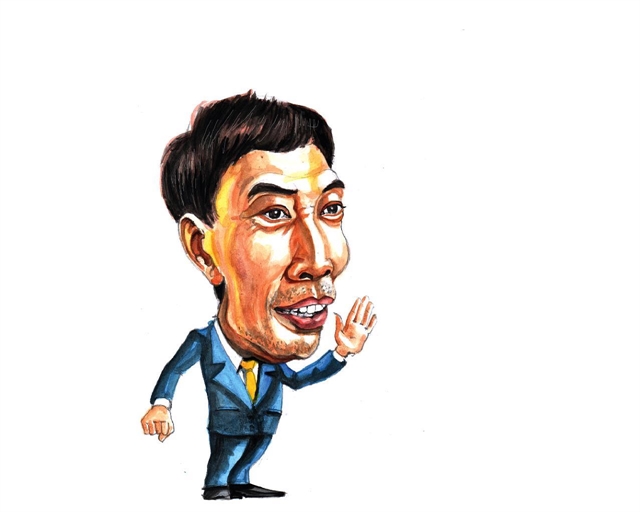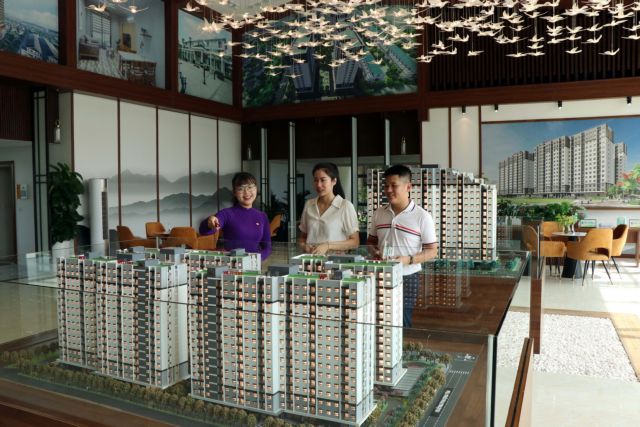 |
Võ Trí Thành*
Since the second half of 2022, the real estate market and property businesses have fallen into a turbulent period with sales decreasing, capital shortage and many projects slowing to a standstill.
Especially, after the COVID-19 pandemic and cases of real estate tycoons seriously violating financial laws and committing bond fraud uncovered, the market downturn has caused a significantly negative impact on the whole national economy. Obstacles in the market as pointed out by insiders are mostly rooted from loopholes and overlaps in legal frameworks.
Therefore, removing legal bottlenecks for the sector, which directly and indirectly contributes 13-14 per cent to the country’s GDP, will mean to create an impetus for the economy to recover more rapidly and a spillover effect on the development of other related sectors.
On the last day of June, also the last day of the 15th National Assembly’s 7th session, NA deputies voted to approve the early enforcement of three legal documents that are expected to have great and positive impacts on the real estate market.
Accordingly, the amendments and supplements to the 2024 Law on Land, the 2023 Law on Housing, and the 2023 Law on Real Estate Business will come into effect on August 1 as proposed by the Government, five months earlier than planned.
It demonstrates a significant effort by the Government and the NA, aiming to bring beneficial laws into effect early to promote socio-economic development.
Law on Land
The Law on Land approved by the NA at the extraordinary 5th session on January 18 is expected to boost the real estate market, maximising the potential and efficiency of land resources.
The new land law, with many favourable provisions for citizens and businesses, will remove difficulties in accessing land for production and business, attract investment, and contribute to achieving socio-economic goals, providing tangible benefits to citizens.
First, the 2024 land law allows overseas Vietnamese to have land use rights. Specifically, Vietnamese people residing abroad with Vietnamese nationality have the same rights and obligations as those living in the country. This regulation demonstrates the State policy of equality and non-discrimination, confirming that the Vietnamese community residing abroad is an inseparable part of the Vietnamese nation.
This policy will create conditions to attract many Vietnamese intellectuals, businessmen, and managers living abroad to return home to make investments, do business, and encourage them with their resources, knowledge and expertise in advanced science and technology to participate in building and protecting the country.
Second, the new land law allows individuals who do not directly engage in agricultural production to receive rice-planting land transfers. This policy will make the agricultural land market segment have new impulses because it will facilitate organisations and individuals who have capital and capacity and wish to invest in the agricultural sector to contribute to the sector’s development, improving the capacity and qualifications of the farming class. In addition, this regulation also prevents those who receive agricultural land use rights, but do not use land for farming purposes. The law stipulates that an individual who wants to receive a land use rights transfer must develop a production and business plan and have it approved by the People’s Committee [Administration] at the provincial and district levels.
Third, the revised land law improves policies for managing and using agricultural land by expanding the land transfer limit to no more than 15 times the local land allocation limit. The new law allows agricultural land users to change crop farming and animal husbandry structures and use a portion of the land to build facilities directly serving agricultural production.
Fourth, the law regulates the issue of accumulation and concentration of agricultural land, creating a legal basis for forming large-scale fields, thereby contributing to the industrialisation and modernisation of agriculture.
Notably, the new law eliminates the land price framework, establishing a mechanism and methods for determining land prices based on market principles. The annual land price list will be published publicly on January 1 every year, in line with market mechanisms, a critical regulation to protect land users and help the real estate market develop more transparently and healthily, preventing “virtual land fever”.
As we can see, prolonged disputes have often been related to compensation and site clearance, mainly due to compensation not reflecting market value. Similarly, resettlement areas often fail to provide enough facilities or equivalent living conditions to relocated people.
The new land law specifies clear and transparent compensation and resettlement mechanisms, requiring land valuations to closely match market prices. If the land price does not reflect market value, the annually published land price list, multiplied by a coefficient, will be used. Thus, the new law aims to protect land users whose land is acquired, ensuring they receive fair benefits.
Finally, related to the issue of land use rights certificates, the law allows land users without documents before July 1, 2014 but using land without violating land law or disputes, to be granted certificates of land use rights without collecting land use fees.
 |
| Apartment buildings in Thủ Đức City. Housing investors are allowed to collect from home buyers a deposit of maximum 5 per cent of the value of a real estate to be formed in the future, according to the new Law on Real Estate Business. — VNA/VNS Photo Hồng Đạt |
Law on Real Estate Business
New regulations stipulated in the Law on Real Estate Business will help create conditions for truly capable property companies to stand firm and do business methodically and compatibly, and gradually eliminate investors with limited financial capacity who only earn profits by selling land plots to people or just developing housing projects without providing social and technical infrastructure.
The 2023 Law on Real Estate Business introduces 11 new points, particularly focusing on the public disclosure of real estate transaction information to ensure transparency and safety.
The first new point is that the new law stipulates a deposit of no more than 5 per cent of the value of the real estate to be formed in the future, and the value of that property must be clearly stated in the deposit contract. Project investors must source funds from available cash, bank loans or bond issuance. This strict regulation reduces risks for buyers of future real estate.
The 2014 real estate business law did not regulate the deposit rate, which creates loopholes for some investors with weak financial capacity to take advantage by collecting money from buyers but delaying construction.
In addition, the law requires parties participating in real estate business transactions to record the actual value in the contract, and brokerage fees must be paid to brokers’ bank accounts. Thereby, it will avoid false declaration of contract information to evade taxes.
The 2023 real estate business law, when coming into effect, will contribute to improving the quality of the brokerage team. The law stipulates that individuals are not allowed to practise independently as brokers. Instead, they must be employed as brokers by a real estate brokerage enterprise or a real estate trading floor.
 |
| Customers seek information of a social housing project in the Thừa Thiên-Huế Province. Conditions to buy social houses will be relaxed according to the new law on housing. — VNA/VNS Photo Đỗ Trưởng |
Law on Housing
The 2023 Law on Housing includes many groundbreaking provisions, contributing to the goal of perfecting the legal framework, enhancing management efficiency, and developing housing, particularly social housing.
Among eight new points of the law, a notably positive one is that social housing investors are allowed to be exempt from procedures for determining land prices, land use fees, and rental fees, resolving issues for this segment.
In addition to policies such as exemption and reduction of land use fees and loans at preferential interest rates, the law allows investors to build social housing to reserve 20 per cent of the land area to build commercial housing.
The law supplements regulations on building accommodation for workers working in industrial parks, industrial clusters, and high-tech zones; as well as allows the Vietnam General Confederation of Labour to participate in the construction and development of the social housing system.
To increase demand for social housing, the law also expands the definition of social housing buyers. For example, students at universities, colleges or ethnic boarding schools; workers in enterprises, cooperatives, and cooperative unions in industrial zones are allowed to buy social housing.
Moreover, conditions for people to be recognised as social housing buyers such as having income less than VNĐ11 million per month have been removed. The new regulation ensures that the average monthly income of the applicant and his/her spouse does not exceed VNĐ15 million per month. Residency requirements are waived; only temporary residence registration is needed to purchase a house.
As of the end of the first quarter, 28 localities have announced 68 lists of projects eligible for a credit package of VNĐ120 trillion for social housing, worker housing, renovation and reconstruction of old apartment buildings according to Resolution No. 33/NQ-CP dated March 11, 2023 of the Government. Total capital needed for the 68 projects is estimated to reach VNĐ30 trillion. However, only six social housing projects in seven localities have been disbursed with a capital of nearly VNĐ531 billion. The reason is that many businesses investing in social housing do not meet the criteria and conditions for loans according to credit laws and short-term loans not attractive to investors.
The law stipulates that it will consider granting certificates of land use rights and housing ownership for mini apartments. This means that this segment will be officially legalised, thereby creating conditions to increase supply and ensure benefits for people living in mini apartments.
 |
| A view of Đà Nẵng City. Three real estate market-related laws and specially designed mechanisms and policies for development of the central city which have been approved by the National Assembly are expected to bring practical benefits to local people and businesses. VNA/VNS Photo Văn Dũng |
Expectations
We have reasons to believe that these new laws are foundations for the sustainable development of the real estate market because they would likely help balance the market supply and demand, smooth the capital flow, make the financial and banking system operate more transparently and healthily.
Particularly, the regulations are expected to resonate with provincial and municipal master plans and specially designed mechanisms for development of localities – such as those of the central province of Nghệ An and Đà Nẵng City which were just approved by legislators in the NA’s 7th meeting, thus policies related to planning on urbanisation, land use and construction will be more effective.
How well the new regulations are brought into life and make a healthy, sustainable and green development for the real estate market will depend on the decrees detailing the laws’ implementation. Therefore, relevant ministries and agencies should work on the decrees urgently so that they would come into effect at the same time with the laws.
Hopefully, legal solutions, along with other compatible measures, will be effective and help business activities in the real estate sector as well as related industries in 2024 and the following years prosper and bring practical benefits not only for real estate businesses, but also the country and people as the whole.
*Võ Trí Thành is former vice-president at the Central Institute for Economic Management (CIEM) and a member of the National Financial and Monetary Policy Advisory Council. With a doctorate in economics from the Australian National University, Thành mainly undertakes research and provides consultation on issues related to macroeconomic policies, trade liberalisation and international economic integration. Other areas of interest include institutional reforms, financial systems, and economics of development. He authors the Việt Nam News column Analyst’s Pick.
- Reduce Hair Loss with PURA D’OR Gold Label Shampoo
- Castor Oil Has Made a “Huge” Difference With Hair and Brow Growth
- Excessive hair loss in men: Signs of illness that cannot be subjective
- Dịch Vụ SEO Website ở Los Angeles, CA: đưa trang web doanh nghiệp bạn lên top Google
- Nails Salon Sierra Madre
 VnExpress News The News Gateway of Vietnam
VnExpress News The News Gateway of Vietnam




